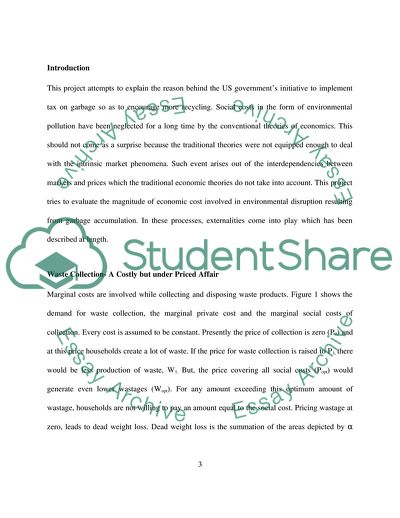Cite this document
(Economics Garbage Report Example | Topics and Well Written Essays - 1250 words, n.d.)
Economics Garbage Report Example | Topics and Well Written Essays - 1250 words. https://studentshare.org/environmental-studies/1741151-using-microeconomic-theory-explain-the-effect-of-the-us-government-putting-a-price-on-garbage-in-order-to-encourage-more-recyclinginclude-an-expalnation-as-to-why-recycling-is-encourage-in-terms-of-externalitiessuggest-an-alternative-for-the-government
Economics Garbage Report Example | Topics and Well Written Essays - 1250 words. https://studentshare.org/environmental-studies/1741151-using-microeconomic-theory-explain-the-effect-of-the-us-government-putting-a-price-on-garbage-in-order-to-encourage-more-recyclinginclude-an-expalnation-as-to-why-recycling-is-encourage-in-terms-of-externalitiessuggest-an-alternative-for-the-government
(Economics Garbage Report Example | Topics and Well Written Essays - 1250 Words)
Economics Garbage Report Example | Topics and Well Written Essays - 1250 Words. https://studentshare.org/environmental-studies/1741151-using-microeconomic-theory-explain-the-effect-of-the-us-government-putting-a-price-on-garbage-in-order-to-encourage-more-recyclinginclude-an-expalnation-as-to-why-recycling-is-encourage-in-terms-of-externalitiessuggest-an-alternative-for-the-government.
Economics Garbage Report Example | Topics and Well Written Essays - 1250 Words. https://studentshare.org/environmental-studies/1741151-using-microeconomic-theory-explain-the-effect-of-the-us-government-putting-a-price-on-garbage-in-order-to-encourage-more-recyclinginclude-an-expalnation-as-to-why-recycling-is-encourage-in-terms-of-externalitiessuggest-an-alternative-for-the-government.
“Economics Garbage Report Example | Topics and Well Written Essays - 1250 Words”. https://studentshare.org/environmental-studies/1741151-using-microeconomic-theory-explain-the-effect-of-the-us-government-putting-a-price-on-garbage-in-order-to-encourage-more-recyclinginclude-an-expalnation-as-to-why-recycling-is-encourage-in-terms-of-externalitiessuggest-an-alternative-for-the-government.


